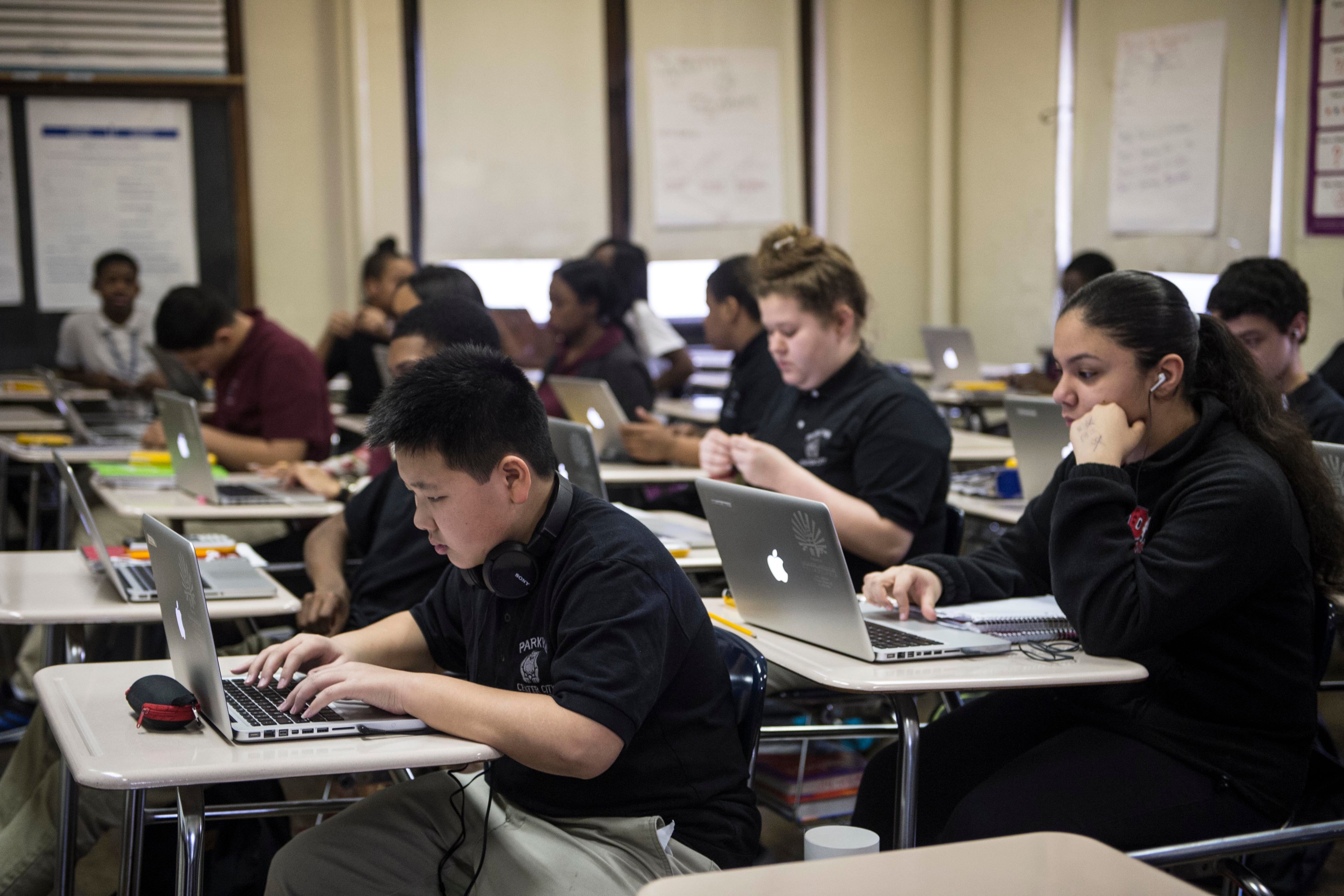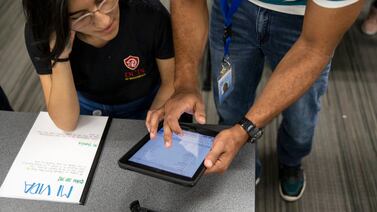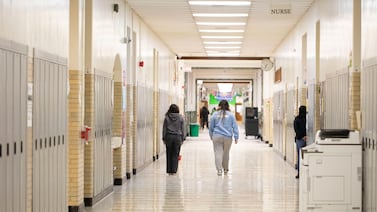Sign up for Chalkbeat Philadelphia’s free newsletter to keep up with the city’s public school system.
The Philadelphia school district is revising its selective admissions lottery process yet again by giving students the ability to rank several choices, adjusting waitlists, and employing a widely used algorithm.
Officials are instituting the changes after a survey by the consulting firm Accenture found widespread dissatisfaction among students and families with how the system worked in its first year in 2022-23.
The new system “will allow us to do a better job extending more offers and when we have vacancies we can more quickly fill those vacancies with qualified students,” said Superintendent Tony Watlington at a back-to-school event on Tuesday.
The district decided to change its high school admissions process three years ago in order to expand access to the district’s citywide and selective middle and high schools. Historically, those schools enrolled relatively few Black and Hispanic students from low-income families living in certain parts of the city.
But so far, the new system, which also prioritizes certain ZIP codes, has made slow progress in reaching its goal. And last year, the lottery left many other citywide admissions schools with hundreds of unfilled seats, sparking anger and causing staff cuts. After the 2023 audit, the district tweaked its admissions process for the 2024-25 school year, but has decided another overhaul is warranted.
The school selection process for the 2025-2026 school year opens on Friday, Sept. 13, 2024 at 4:00 p.m., and closes on Wednesday, Oct. 23, 2024 at 11:59 p.m.
These are the major changes to the selective admissions process that will take effect for the 2025-26 school year:
- Students will rank their schools and waitlists will operate differently. Students will be able to rank their top five choices. If they are accepted into their third choice, for instance, they will remain on a waitlist for their first and second choices, but dropped from consideration for their fourth and fifth choices. Currently, students submit five schools in no particular order and might be accepted into all five or none of them, even if they meet the qualifications. In a statement, the district said that “offers will be made based on the order in which an applicant ranked their five schools, the applicant’s eligibility, and seats available at the school/program.”
- The district has changed the priority ZIP codes: From its inception, the lottery system prioritized students from certain ZIP codes, most of them in North and West Philadelphia. They are 19121, 19140, 19133, 19136, and 19124 and 19134. For the coming year, it is dropping 19132, and adding 19134, based on data showing which ones have the lowest representation of students at the most highly selective schools.
- Offers to qualified middle school students who want to stay at their school are guaranteed. Students in five selective schools that start in fifth or sixth grade and go through high school will be assured a ninth grade seat if they rank their school as their first choice and meet all admissions requirements. The schools are: Girard Academic Music Program (GAMP), Carver High School of Engineering and Science, Hill-Freedman World Academy, Masterman, and Science Leadership Academy at Beeber. Before, these students had to enter the lottery like everyone else.
- The district is using a different algorithm to match students with their choices. It will now use a version of an algorithm that previously won the Nobel Prize and is known as the “deferred acceptance” algorithm. It’s been used for everything from matching medical students with residency programs to connecting potential dating partners on the Hinge app. A version of the new algorithm is already in use by the city’s Apply Philly Charter enrollment system.
- Students have a new way to research options. In February, the school board approved a $1.6 million contract with Avela, a software company. According to the Accenture report, the system under the company the district previously contracted with, SchoolMint, was rife with technical difficulties and errors that frustrated families and school counselors. Avela’s tool, called Explore, is a more comprehensive and user-friendly tool for students to research their school choices, according to the district.
- Schools will no longer accept PASA scores in applications. The Pennsylvania Alternate System of Assessment is a standardized test for students with significant cognitive impairments. It is taken by under 1% of students in the district.
Questions about algebra, tests linger for selective admissions
The lottery system, which debuted in 2022, replaced a longstanding process that relied heavily on principal choice and favored students who attended schools with enough counselors to provide advice and help with applications.
The district has different entry requirements for its array of selective admissions and citywide admissions schools, most of which are middle and high schools. Qualifying students must meet minimum percentiles on standardized tests — ranging from being in the top 50% to the top 20% for magnet schools like Masterman and Central — and satisfy grade and attendance requirements.
The new admissions system won’t address all of the challenges and controversies around admissions.
One of the more high-profile issues involves eighth grade algebra. The district is working to expand algebra access, but most schools in the prioritized ZIP codes don’t offer it. And Masterman, Philadelphia’s flagship high school, requires applicants to have taken eighth grade algebra. District spokesperson Christina Clark said she did not have information on whether algebra access is expanding for this coming school year.
Most district students take the Pennsylvania System of School Assessment, or PSSA, and can use those standardized test scores to satisfy admissions requirements. Students coming from private and charter schools may submit scores from a different standardized test, such as the Terra Nova. But judging the impact of eliminating the PASA could be difficult.
Under a 1995 consent decree known as LeGare, the district has been under a court order to offer equitable access to all its schools to students with disabilities and English learners. In announcing the new system, officials did not make any reference to LeGare.
Abigail Beljean, who has two children in the district, is a former counselor at the Wissahickon Charter School. She helped students make their high school choices, and said that she hoped the new system would not impede opportunities for students with disabilities to schools.
In her experience, a student who might need an alternative assessment like the PASA could also “be an incredible artist or musician,” she said, and could succeed at schools like Creative and Performing Arts High School (CAPA) and GAMP.
She noted that before the lottery, principals could use their discretion to admit students who missed the required percentile on a standardized test by just a point or two. They no longer have that option.
Overall, she said, while the district “has made some good changes,” to make the process more fair, she hopes it maintains “some kind of pathway” for students who barely miss a test-score cutoff, or who have in the past taken the PASA test rather than the PSSA.
“If a kid can’t take the PASA, but has no other standardized test to submit, what do they do?” she said.
Clark said the PASA test doesn’t translate easily into percentile achievement, so is not suitable for judging readiness for the magnet schools. The district is encouraging students with Individualized Education Programs to take another approved alternative standardized test, or they can apply to waive that requirement.
Overall, said Jane de Lartigue, whose seventh grader at Houston Elementary School in Mount Airy will be applying to high schools this time next year, the new system “seems more equitable.”
Lartigue said that parents she has talked to and those in online discussion groups are hoping that students will now “have a better chance of getting into a school that they would prefer.”
“In theory it will help parents get a school that best matches their needs, while also freeing up other school spots sooner in the process,” said parent Emily Chaudhury in a comment posted to the NW PHL Public Schools Discussion Group on Facebook. “This will get more kids offered spots in the few rounds of wait-list offers than what has happened in previous years, leaving fewer kids without spots and fewer schools with empty seats – and staff reductions.”
While most admissions occur at the high school level, the new lottery process will apply to students currently in pre-kindergarten through eleventh grade who are applying to any school outside their regular neighborhood catchments that have admissions standards.
Philadelphia Bureau Chief Carly Sitrin contributed to this story.
Dale Mezzacappa is a senior writer for Chalkbeat Philadelphia, where she covers K-12 schools and early childhood education in Philadelphia. Contact Dale at dmezzacappa@chalkbeat.org.






